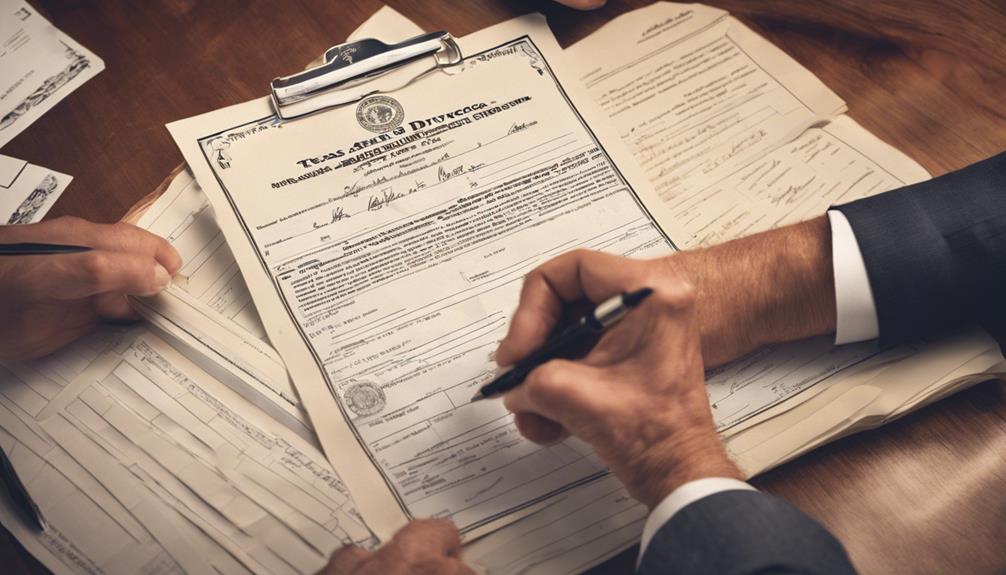In Poland, the end of a marriage is governed by laws that aim to guarantee a fair and transparent process. It is important for those experiencing this challenging time to understand the basic principles of the country’s divorce laws. This guide is meant to explain the legal framework, steps, and key points to keep in mind during divorce proceedings in Poland. Whether your divorce is contentious or amicable, the information provided here will help you prepare for what lies ahead.
The process of obtaining a divorce in Poland involves several stages, from filing the initial paperwork to the final decree being issued by a court. Throughout this journey, individuals must navigate various legal requirements, including mandatory conditions for divorce, child custody arrangements, and financial settlements. By familiarizing themselves with Polish divorce law, individuals can make informed decisions and navigate the divorce process with greater confidence and understanding.

Understanding the Basics of Polish Divorce Law
At its core, Polish divorce law revolves around the legal dissolution of a marriage. This process is designed to formally end a marriage, addressing issues like asset division, child custody, and alimony. Understanding these basics is the first step towards navigating a divorce in Poland.
Key Conditions for Initiating a Divorce in Poland
To start the process of obtaining a divorce in Poland, certain conditions must be met. These include paying a court fee and proving that the spouses have common minor children. The court in Poland looks into these aspects to decide on a divorce decree.
Mandatory Conditions and Grounds for Divorce
A crucial aspect of Polish divorce law is the requirement for demonstrating a permanent breakdown of the marriage. This condition forms the basis of the divorce proceedings and must be shown for the court to grant a divorce.
Legal Separation vs. Divorce: Definitions and Differences
Legal separation and divorce are distinct under Polish law. While both processes address issues arising from marital breakdowns, divorce legally ends the marriage, whereas legal separation allows spouses to live apart without ending the marriage formally.

The Legal Framework Surrounding Divorce Proceedings
Polish divorce law provides a structured approach to the dissolution of a marriage. This framework outlines the procedures, rights, and obligations of the parties involved, guiding them through the complex process of legally ending a marriage.
Jurisdiction and Applicable Laws for Divorce Cases
In Poland, the jurisdiction and laws applicable to divorce cases depend on several factors, including the spouses’ residency and nationality. The court in Poland oversees these proceedings, applying Polish family law to resolve the issues at hand.
The Divorce Process in Poland Demystified
The law applicable to divorce in Poland is designed to ensure fairness and clarity throughout the process. From filing the initial paperwork to the final decree, understanding this legal framework is key to navigating divorce proceedings effectively.
Preparing for the Divorce: First Steps and Consultations
When preparing for divorce, especially in cases involving international divorce, obtaining legal advice on matters like filing for divorce and parental authority is essential. These first steps set the stage for the proceedings ahead.

The Importance of a Divorce Lawyer in Poland
In cases of international divorce, hiring a divorce lawyer in Poland is critical. Their expertise in filing for divorce under Polish law can significantly impact the outcome, ensuring that the legal rights and interests of the parties are protected.
The Role of Divorce Mediation in Amicable Settlements
Divorce mediation offers a pathway to amicable settlements, focusing on cooperation and compromise. This approach can often result in more favorable outcomes for both parties, especially when children are involved.
Mediation Costs and What Issues It Can Resolve
Mediation costs in Poland are regulated and offer an economical alternative to court proceedings. This process can address a range of issues, including disputes between parents and children, and matters requiring a power of attorney.

Navigating Through Court Proceedings
The journey through court proceedings in a divorce case requires careful navigation. Understanding the steps involved, from filing the petition to obtaining the final decree, is crucial for a smooth process.
From Filing the Divorce Petition to the Final Decree
Paying the court fee and filing the divorce petition mark the beginning of the divorce process in Poland. The court then examines the case, taking into account the couple’s joint place of residence, before issuing the final decree.
Financial Aspects of Divorce in Poland
Addressing the financial aspects of divorce in Poland involves understanding the division of assets, alimony, and child support. This ensures that financial obligations are met fairly and appropriately following the divorce.

Determining Alimony and Maintenance for the Divorced Spouse
In Polish divorce law, spousal maintenance is awarded under specific conditions to ensure the financial well-being of the entitled person. Generally, if one spouse is unable to maintain their standard of living post-divorce due to age, health, or unemployment, they may be eligible for alimony. However, in exceptional circumstances, even if the entitled person is at fault for the divorce, they might still receive maintenance, especially if not granting it would cause significant hardship.
Criteria for Alimony Eligibility and Calculating Payments
To be eligible for alimony in Poland, a spouse must file for divorce and prove their inability to support themselves, taking into account their health, age, and job prospects. The court considers both spouses’ financial situations, including income, property, and potential earning capacity. The amount of alimony is calculated to cover the reasonable needs of the entitled person while considering the payer’s ability to pay. The process is complex, and often, legal assistance is required to navigate the requirements and calculations.

Adjusting Alimony Payments: Increases, Reductions, and Termination
After the court sets the alimony amount, changes in the financial situations of either party can lead to adjustments. To increase, reduce, or terminate alimony payments, one must file for divorce court approval, providing evidence of a significant change in circumstances, such as a job loss, illness, or remarriage of the entitled person. The court evaluates these changes carefully to ensure fairness and the continued well-being of both parties.
Handling Debts and Financial Obligations Post-Divorce
After a divorce in Poland, both parties must consider matters relating to their shared financial responsibilities. This includes handling any debts accumulated during the marriage. The division of these obligations is crucial for both individuals to move forward. Proper legal advice can help ensure that debts are fairly divided, preventing financial disputes in the future.
Child Custody and Support Considerations
In Poland, divorce proceedings significantly impact children, especially when it comes to custody and support. The court prioritizes the best interest of the child, often leading to arrangements that facilitate continued contact with both parents. Divorce or separation can also trigger discussions on child support to ensure the child’s needs are met, taking into account the financial capabilities of each parent.
The Impact of Divorce on Minor Children
Divorce can be challenging for children. The court decides on matters relating to the children’s place of residence and contacts with children to ensure stability. It aims to minimize the impact on the lives of minors when spouses have common minor children.

Custody Arrangements and Parental Agreements
Creating a parenting plan is crucial for the well-being of parents and children. This involves exercising parental rights and responsibilities, including decisions on education and healthcare. A well-crafted agreement can provide a stable environment for children post-divorce.
Calculating Child Support: What You Need to Know
During divorce proceedings, calculating child support is a critical step. The amount is determined based on the child’s needs and the financial capabilities of the parents. This process ensures that despite the divorce or separation, the child’s standard of living is maintained.
Property and Asset Division After Divorce
Divorce in Poland involves dividing the joint property of the spouses, including personal property acquired during the marriage. The division of marital joint property is managed according to Polish law and, if applicable, regulations of the European Union. This ensures a fair distribution of assets.
Splitting Marital Assets: Principles and Practice
Principles guiding the division of assets focus on fairness and equality. This process considers contributions made by each spouse during the marriage.
The Spouses’ Joint Apartment: Rights and Regulations
For divorced spouses, rights to the joint apartment can be complex. The court in the divorce decree may order eviction at the request of one party, especially in cases of grossly reprehensible conduct. Such decisions aim to address the housing needs of both parties in a fair manner.
The Individual’s Surname and Identity Post-Divorce
After a divorce in Poland, individuals may wish to change their surname. This process is facilitated by the registry office. They can revert to their maiden name or choose another surname they had before. This step is significant for many as it symbolizes a new beginning and autonomy over one’s identity post-divorce.
Fault and No-Fault Divorce: Understanding the Difference
In Poland, divorces are categorized into fault and no-fault grounds. A fault divorce is pursued when one spouse’s sole fault in the breakdown of the marriage is established, affecting family members significantly. Conversely, no-fault divorces do not require proving wrongdoing by either party, making the process less contentious and often quicker.
Establishing Fault in Divorce Cases
Polish law underlines that a divorce would be contrary to the principles of social coexistence if a spouse is at fault for the marriage breakdown. This includes violations that sever physical and economic bonds integral to matrimonial unity, as outlined in the Polish Family and Guardianship Code.
Proving Spouse’s Fault and Its Consequences on Alimony
Establishing a spouse’s sole fault in a divorce significantly impacts alimony decisions. If a spouse’s actions detrimentally affected the marriage and family members, the court might decide on alimony based on this fault. This process underscores the importance of proving fault thoroughly to influence post-divorce financial obligations fairly.
Opting for a No-Fault Divorce: Process and Implications
Opting for a no-fault divorce in Poland means that the spouses agree to end their marriage without blaming each other. This process focuses on resolving maintenance costs and contacts with children amicably. The implications of choosing no-fault divorce include a potentially smoother legal process and less emotional stress, allowing both parties to focus on future arrangements rather than past conflicts.
Legal Aid and Support Services
Legal aid and support services in Poland provide essential assistance to individuals undergoing the divorce process. These services offer guidance on civil proceedings, helping to navigate the complexities of divorce law. Access to legal aid can make a significant difference in how effectively a person can manage the legal aspects of their divorce.
Accessing Legal Aid for Divorce Proceedings
To access legal aid for divorce proceedings, individuals must meet specific criteria related to their income and the nature of their case. This support plays a crucial role in ensuring fairness and access to justice during civil proceedings.
Eligibility Criteria and Application Process for Legal Aid
The eligibility for legal aid in Poland is determined by income level and the complexity of the divorce case. Applicants must submit evidence of their financial situation along with details of their case to be considered. Successful applicants receive legal representation, which can greatly impact the outcome of their divorce proceedings.
Facing Appeals and Post-Divorce Challenges
After a divorce decree, some individuals may face challenges that require them to appeal against the decision. The appeal process in Poland allows for the review of court decisions, ensuring that the rights of both parties are adequately protected.
Appealing Against the Divorce Decree
Individuals who disagree with the divorce decree from a court in Poland have the option to file an appeal. This legal mechanism ensures that parties have a chance to contest decisions that they believe were unjust or overlooked crucial evidence.
Grounds for Appeal and the Appeal Process
To appeal against the divorce decree in Poland, one must present valid grounds such as procedural errors or misinterpretation of the facts. The appeal process involves submitting a formal request to a higher court in Poland, which then reviews the case and makes a determination. This step is crucial for those seeking to rectify what they perceive as an injustice in the initial ruling.
Enforcement of Divorce Decrees and Orders
Enforcing divorce decrees and orders in Poland is essential for ensuring that all parties adhere to the terms set by the court. This includes compliance with maintenance for children and contacts with children as decided.
Steps to Take if a Divorce Decree is Not Followed
If a divorce decree the court decides is not followed, the affected party can request enforcement from the court upon request. This might involve the court taking measures to ensure compliance, including revisiting maintenance for children and arranging contacts with children. It’s a critical step in upholding the legal obligations set forth in the divorce agreement.
FAQs on Polish Divorce Law
Polish divorce law, part of the broader civil law, covers various aspects of divorce and separation, providing a framework for the orderly dissolution of marriage. Questions often arise about procedures, rights, and obligations during and after a divorce, highlighting the need for clear and accessible information.
Can I Change My Surname After Divorce?
After a divorce in Poland, individuals have the right to change their surname. The process involves submitting a request to the registry office, which then officially records the change. This allows for the restoration of a pre-marriage surname or the adoption of a new one, depending on the individual’s preference.
Who Bears the Costs of Divorce in Poland?
In Poland, the costs of divorce, including court fees, can be borne by either or both parties, depending on the court’s decision. The court may also order one party to cover the other’s legal expenses if they have a power of attorney. Additionally, financial responsibilities for parents and children are considered separately, focusing on the best interests of the children.
A New Chapter: Life After Divorce in Poland
Life after divorce in Poland involves navigating legal, emotional, and practical changes. From adjusting to a new standard of living to dealing with the proceedings of civil cases, individuals face numerous challenges. However, with the right legal advice and support systems, it is possible to move forward positively. The process encourages a focus on the future, ensuring that decisions are not detrimental to the welfare of any minor child of both spouses. Importantly, a no-fault divorce can reduce excessive delay in the proceedings, allowing both parties to start anew more swiftly.
Rebuilding and Moving Forward Post-Divorce
Rebuilding life after divorce often involves addressing the lack of any spiritual bonds between the spouses that remained. It’s a time for personal growth, rediscovery, and setting new goals.
Embracing Changes and Seeking Support Systems
Embracing the changes that come with divorce is crucial for personal development. Seeking out support systems, whether through friends, family, or professional services, can provide the guidance and encouragement needed to navigate this new chapter in life. It’s an opportunity to build a fulfilling life post-divorce.










